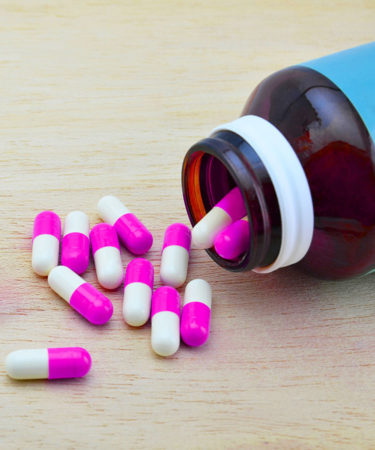When it comes to assessing the best advice for dealing with a hangover, suggestions are plentiful. From Ancient Egyptian lore to the hair of the dog, age-old experiments may be great for when you’re feeling a little weathered after a night out, but when you’re really hungover, only one solution works best: medicine.
However, when it comes to medicating your booze filled blitz, the drugstore can feel overwhelming, with the number of options second only to that of an all-you-can-eat buffet. Combined with neurotransmitters bogged down by the excess alcohol consumed the night before, it’s hard to know which medications will work best when you’re in pain.
When assessing the best hangover cures, it’s important to disregard any advice recommending that you take any before going to bed. When taking over-the-counter (OTC) medications like Advil or Tylenol for a hangover, you always want to make sure all of the alcohol is first out of your system.
“Mixing alcohol with medication can be hazardous to your health and in a perfect world, alcohol and OTC pain meds would not be taken together,” says Tara Kay, doctor of clinical pharmacy. “Alcohol can render some medications less effective and can enhance the effects of other medications. This can lead to undesired adverse effects.”
That said, it’s still a huge pain — figuratively and literally — to wake up the morning after a night out feeling anything less than spry. So sit back, get a tall glass of water, some greasy food, and read on for more information on the best painkiller for a hangover and its interactions with alcohol.
Advil
Active Ingredient: Ibuprofen
With a dosage of just one to two 200 milligram pills every 4-6 hours, Advil is ideal for treating a mild hangover. Packed into small, sugar-coated pills, the ibuprofen for hangovers is perfect for any irritating symptoms, but probably won’t do much else for you. Plus, if your hangover is accompanied by any nausea, it’s probably best to steer clear of the painkiller altogether. As a non-steroidal anti-inflammatory drug (NSAID), one of the main side effects of ibuprofen is stomach irritation. Dr. Kay warns that while consuming small amounts of alcohol and ibuprofen may not be dangerous, taking more than the recommended dose — which people are known to do with Advil’s small dosage — along with excessive amounts of alcohol may increase the risk of gastrointestinal bleeding and kidney problems.
Tylenol
Active Ingredient: Acetaminophen
While Tylenol might be great for fighting colds, when it comes to hangover relief, it leaves much to be desired. Not to mention Tylenol Extra Strength, which really should just be called Extra Disappointment. Combined with the fact that acetaminophen’s most serious side effect is liver failure, taking it while your liver is already in overdrive is probably not the best bet when it comes to lowering your risk of liver damage.
Aleve Liquid Gels
Active Ingredient: Naproxen
Unlike Advil or Tylenol, when it comes to treating a hangover, Aleve delivers on its promise of providing 12-24 hour relief. In addition to alleviating headache symptoms, taking Aleve for a hangover can also help ease some of the painful body aches that accompany a more severe case . Just be careful taking it if your stomach feels a bit uneasy, while anecdotal accounts may claim that the Liquid Gels can help soothe nausea, Dr. Kay points out that naproxen is also an ASAID, meaning it can cause the same stomach problems as Advil.
Excedrin Extra Strength
Active Ingredients: Aspirin, Acetaminophen, Caffeine
Popping Excedrin for hangovers is like ingesting the classic hangover cure combo of coffee and aspirin. If you’re dealing with a pounding headache by the time your eyes peek open, the caffeine and pain killer combo could be ideal. Your headache might go away and the caffeine could give you a burst of mental clarity, but if you’re nauseous, the mix could leave you feeling sicker as caffeine has a way of exacerbating any queasy feelings. And, with acetaminophen’s risk of liver damage present and aspirin’s risks of gastrointestinal bleeding, Excedrin should be reserved exclusively for morning-after consumption and should not be taken alongside alcohol.
Blowfish for Hangovers
Active Ingredient: Aspirin, Caffeine
Unlike other OTC medications on this list, Blowfish is unique because it’s specifically advertised as a cure for hangovers. Once the two tablets have been dissolved in water, Blowfish delivers a dose of aspirin and caffeine to the system, helping level pain and make you more alert. Plus, needing to be consumed in water not only helps the medication to act faster, but gives you an extra burst of hydration as well, which is always much needed after a night of drinking. As Blowfish contains aspirin, however, it’s best consumed in the morning when all alcohol has left your system as Dr. Kay warns that “the combination may increase impairment levels, as aspirin can increase blood alcohol levels.”
No matter which pain medication you choose, you should always consult your doctor to figure out which is safest for you and drink it with plenty of water. It’s also imperative to make sure you space out the time between your alcohol and pill consumption. If you must take pain medication with alcohol in your system, Dr. Kay recommends reading each package label carefully and only taking the medication according to package instructions.
